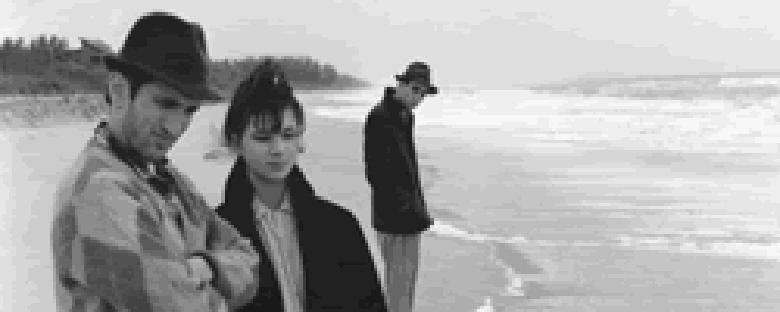Reviews
“You know, it’s funny,” says a character in a half-completed trek from New York to Florida in Stranger Than Paradise; “You come to some place new, and everything looks just the same.” It is a telling line in Jim Jarmusch’s seminal work.
The film is concerned with three characters: Willie and Eddie, jobless and uninspired New York drifters, and Eva, Willie’s cousin from Hungary. The film is divided into three specific segments and among three specific locations, yet is not about the threesome’s trip, nor about their aspirations in traveling. There may be an identifiable narrative structure (the film is episodically divided), though its parts neither rely upon nor benefit from their sum. Its characters’ vacant aspirations are equated by Stranger Than Paradise’s lack of conventional purpose — this is the film’s idiosyncratic strength.
The three travel from New York slums to a Cleveland suburb to an unspecified locale in Florida. The film’s most exotic scene is the front of Lake Erie; the coast is, however, blanketed in snow, robbed of any visual worth. It is literally an emptiness, a massive, white expanse with no horizon. The moment epitomizes the film, as it suggests that these are characters in a world with little distinction, confined in a landscape of austere familiarity. The three arrive at the frozen coast, see nothing, and casually move onward.
The film was shot on a high-contrast black and white film stock, which highlights the grimy texture of the country’s gutter: chipped paint, dirty tiles, carpets laden with soot. Its three central characters are invariably tied to this environment: their dress is indistinctive, and their speech is marred, delivered in mumbled statements. Upon crossing Florida’s northern border, Willie buys sunglasses for each passenger, and each is uncomfortably aware of the foreign accessory when it is placed on them. “Now we look like tourists,” says Willie. It is an apt statement, a joke that implies that the accessory will enable them to see something new.
“The New World” is the film’s introductory third: Willie inhabits a tiny apartment in New York. His cousin Eva is traveling from Hungary to Cleveland, and will make a stop to stay with him. Eva represents Willie’s rejected foreign heritage. Prior to Eva’s visit, Willie receives a call from his Hungarian aunt, and insists that she speak English, despite the fact that he clearly understands her native dialect. Willie — who is never seen outside his apartment in this opening third — is callous to the world he inhabits. To him, Eva is annoyingly enchanted.
Early in her visit, Eva observes Willie as he eats a TV dinner — a device that reduces a common practice to its most convenient and forgettable; it is emblematic of an American lifestyle. Eva notices the irony that Willie does not compliment this meal by activating his television.
Eva and Willie begin to conform to each other’s lifestyles. Willie empathizes with Eva’s freedom (resulting in his forthcoming trip to see her in Cleveland), and she with his native adaptation. Before she leaves, she has inherited his slang. It is apparent Willie feels regrettably responsible for this contamination. Prior to Eva’s leave, Willie buys her a dress. It is a gesture in which he acknowledges his influence, and attempts to amend his less-respectable effects.
Once Eva departs Willie leans against the shut door, his diminutive apartment once again filled with silence. Later his beatnick friend Eddie visits to share a beer, and the scene lasts with no action and no dialogue. As with much of the film, there is nothing to say or do. Stranger Than Paradise highlights such moments in which nothing happens, yet at the same time make evident an internalized action in its characters.
“One Year Later” ensues with a poker match rigged by Willie and Eddie. The two are accused of cheating, exit, and add the funds to their growing profit. They have been planning a trip to visit Eva. It is affirmed, at this point, that both Willie and Eddie (who appears briefly in “The New World” and meets Eva) have been affected by Eva, for reasons that are either sexual or platonic. Either way, for both she supplies an option in a life distinguished for little choice. At the end of their visit, the two lure Eva in their travel to Florida. (The triptych is completed with the segment “Paradise.”)
There is a confident patience in this film. Several scenes will linger on static compositions: one shot in particular simply consists of the trio in a theater watching a film (Eddie and Willie bookend Eva, separating her from her intended date). There is an emphasis on composition and contrast, lending the film a distinct and perhaps accidental visual component. There is also a style in the film’s technique: the sound is all live (including music cues), the editing is simplistic, and the film includes several pauses of blackness that serve to separate and isolate scenes. In this minimalist effort — in this lack of interest in enhancing fiction — Stranger Than Paradise achieves something real: it is as blemished and crude as the world it depicts.
We don’t do comments anymore, but you may contact us here or find us on Twitter or Facebook.



